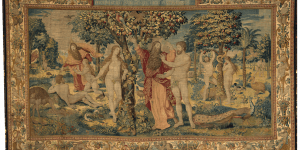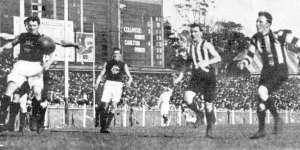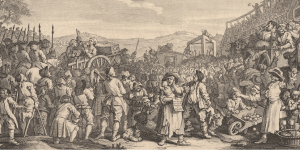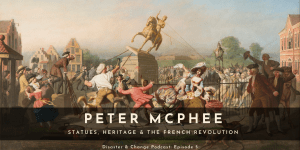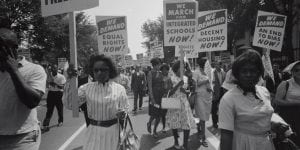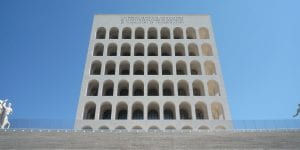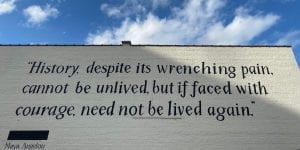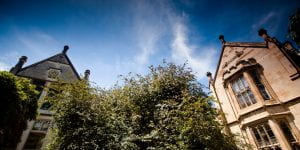Category: History
-
Is This the Earliest Depiction of a Dodo in Art?
The Jagiellonian arrases – tapestries that decorate the walls of Wawel Castle in Poland – may be one of the earliest known artistic representation of the long-extinct dodo. SHAPS Principal Research Fellow Dr Darius von Güttner tells us more in this fascinating article republished from Pursuit. This month marks 500 years since the birth of […]blogs.unimelb.edu.au/shaps-research/2020/08/07/is-this-the-earliest-depiction-of-a-dodo-in-art
-
Sport, Community and Everyday Life: World War One and COVID-19 Compared
For many Australians, the economic pain brought by the COVID-19 crisis has been compounded by the disruption caused to sporting activities. For football-loving Melburnians, the very rhythm of the week was rendered unrecognisable after the temporary suspension of the 2020 AFL season in March. The closing down of sports at the local community level has […]blogs.unimelb.edu.au/shaps-research/2020/07/31/sport-community-everyday-life
-
What Today’s News Has in Common with Early Execution Ballads
Violence, corruption and murder dominate our modern headlines, but little has changed since execution ballads were sung in sixteenth-century Europe. In this article, republished from Pursuit, Lisa Needham talks to Dr Una McIlvenna from SHAPS about the similarities between headlines of today and the early modern period. Since the start of 2020, it’s felt like […] -
Confronting the History of Race and Empathy in the Classroom: A Conversation with Dr Sarah Walsh
In June 2020, Dr Sarah Walsh joined the History Program as our new Hansen Lecturer in Global History. In this new podcast, in conversation with History PhD candidate Amy Hodgson, Dr Walsh discusses her research, and her approach to teaching. The interview traverses a wide range of topics, including the challenges posed by online teaching, especially when it comes to handling difficult and confronting histories of oppression and violence. What approaches can be used to foster empathy and kindness in the classroom? What methods can researchers working on these topics use in order to take care of their own mental health and wellbeing? And what are some useful starting points for people who want to educate themselves about issues around race and racism? -
Episode 5 in the SHAPS Podcast Series: Professor Peter McPhee
Societies have always used statues and other monuments as ways of recognising power and eminence. In Australia, as in many other places, there is currently public debate over whether some statues should be removed, who should make the decision, and what should be the fate of the statues themselves. Should they be displayed with explanatory plaques, taken away to be preserved in museums or simply removed? Such debates are common in history. In this episode, Professor Peter McPhee surveys the wide range of objects destroyed during the French Revolution – from buildings and statues to books and paintings – but also the remarkable responses of revolutionary governments. It concludes with some reflections about the place of monumental statues and heritage sites in Australia.blogs.unimelb.edu.au/shaps-research/2020/07/06/disaster-change-5
-
Race, Change and Time in the USA
Americans are reaching back into history to try to understand why progress on racial equality has been so heartbreakingly slow. In this article, republished from Pursuit, Professor David Goodman explores the question. Many commentators have compared or rejected comparison between the current public protests sparked by the death of George Floyd in the USA and the uprisings […]blogs.unimelb.edu.au/shaps-research/2020/07/03/race-change-and-time-in-the-usa
-
A New Look at the History of Fascism
For decades, third-year undergraduate History students at Melbourne have taken the subject Hitler’s Germany (HIST 30010). From Semester Two 2020, the subject will be expanded to cover the history of European fascism more broadly, reflecting the expertise of the subject coordinator, Dr Ángel Alcalde, who joined the History program in 2019 as Lecturer in Twentieth-century European History. […]blogs.unimelb.edu.au/shaps-research/2020/06/22/a-new-look-at-the-history-of-fascism
-
Racial Justice, Memory & the Museum
In December 2019, History PhD candidate Sam Watts travelled through the Deep South completing research for his thesis on racial politics in the Reconstruction-era urban Deep South. Here he reflects on this trip, historical memory, the nationwide protests following the murder of George Floyd, and the ongoing struggle for racial justice in America. The day […]blogs.unimelb.edu.au/shaps-research/2020/06/09/racial-justice-memory-the-museum
-
Andrew Black
Andrew Black, ‘The Victorian Farmers’ Union, Country, and National Party, 1916-2000: Survival, Adaptation, and Evolution‘ (PhD in History, 2020) This thesis undertakes a detailed analysis of the Country-National Party in Victorian state politics from its formation as the Victorian Farmers’ Union during the First World War through to the defeat of the Kennett Liberal-National Coalition […] -
Stephen Campbell-Wright
Stephen Campbell-Wright, ‘Point Cook: The Crucible of Air Force Capability in Australia’ (PhD in History, 2020) This thesis argues that place can have an influence on cultural heritage. A site can have a profound effect on the cultural heritage of a community or institution through the influence it exerts on public memory and sense of […]blogs.unimelb.edu.au/shaps-research/2020/06/08/stephen-campbell-wright
Number of posts found: 243
